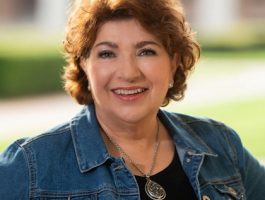
A Time to Heal
Today on the broadcast, Laura Petherbridge, author of the book When Your Marriage Dies, remembers the first night she slipped into bed and realized she hadn't cried that day--a major milestone since her difficult divorce.
Show Notes
About the Guest
-
Today on the broadcast, Laura Petherbridge, author of the book When Your Marriage Dies, remembers the first night she slipped into bed and realized she hadn't cried that day--a major milestone since her difficult divorce.
-

Laura Petherbridge
Laura Petherbridge serves couples and single adults with topics on women’s issues, relationships, stepfamilies, co-parenting, single parenting, divorce prevention, and divorce recovery. She is an international speaker and author of four books including, When “I Do” Becomes “I Don’t”—Practical Steps for Healing During Separation and Divorce, and The Smart Stepmom, co-authored with stepfamily expert Ron Deal and endorsed by Gary Chapman (Five Love Languages...more
Today on the broadcast, Laura Petherbridge, author of the book When Your Marriage Dies, remembers the first night she slipped into bed and realized she hadn’t cried that day–a major milestone since her difficult divorce.
Bob: When Laura Petherbridge's husband left their marriage, it was an eye-opener for Laura about a lot of things.
Laura: What I didn't recognize at that point was all the brokenness that was in me that I didn't know about that came from my parents' divorce, that came from tons of different areas that I didn't even know I was bringing all of that. So until I learned what was broken in me, I couldn't begin to heal.
Bob: This is FamilyLife Today for Wednesday, January 10th. Our host is the president of FamilyLife, Dennis Rainey, and I'm Bob Lepine. When a marriage dies, many people never take a long, hard look inside to see their own issues.
And welcome to FamilyLife Today, thanks for joining us. I've heard you reference a verse in Ecclesiastes, I think it's Ecclesiastes 7, about visiting the house of mourning, about going to funerals. It says it's good for believers to do that and to see the end. It's better to go to the house of mourning than to the house of feasting, I think is what it says.
Dennis: Right, it says the living takes it to heart.
Bob: And typically, we'd apply a verse like that to the death of an individual, but there are other deaths that that kind of a passage can be applied to, do you think?
Dennis: I think there are, and certainly the death of a marriage in a family is one of those events that – well, just as you and I have recently had the chance to do that, Bob, when you visit something that does begin to die, and you begin to know what caused that? What happened there? And it's almost with fear and reverence that you look at it, and you come to your own set of conclusions about what you're going to do in your own life that's going to be different because of what you've observed and seen.
Bob: The living take it to heart, right?
Dennis: The living takes it to heart. And fortunately, we've had with us all this week, Laura Petherbridge, who has allowed us to take a bit of the journey with her, as she shared about her marriage dying back in 1984 and '85, as it went through that process. Laura is an author. She's a speaker and teacher, and lives in Atlanta along with her husband. And, Laura, I want to welcome you back to FamilyLife Today and just thank you for your honesty that you share in your book, "When Your Marriage Dies."
Earlier you talked about how your marriage dying was like going to a funeral, and yet you did heal. You went through a process of moving past the funeral and the grieving process to a time when you began to experience that healing. You said in your book that there was a die you didn't cry, and that was the day you knew you had begun the process truly in earnest.
Laura: Yes. I can distinctly remember the night that I laid my head to the pillow and thought, "I didn't cry today." It was months and months after the original day of finding out that the marriage was over, and I cried every day, every single day, up until that point. And so it's so funny how you remember certain things, but I can remember this distinctly – just, "Oh, my goodness, I didn't cry today," and that was a real milestone because I knew something was beginning to heal and beginning to change; that I had been able to go through a whole day without grieving in the form of tears.
I think –you know, I was a young Christian, but I knew that forgiveness had to be a part of healing. I knew enough about Jesus, I knew enough about Christianity to know that forgiveness had to – and so I began fairly early in the process – I was bound and determined – it was self-centered – I was bound and determined that I did not want to end up an old, bitter woman. And I knew the only way for that to happen was for Jesus to teach me how to forgive. I didn't have any idea how to forgive in this circumstance, but I asked Him, please, I'm willing to become willing if you'll teach me how to forgive in this circumstance, because I hate him, I hate her, you know, I'm just – I want misery in all of their lives.
And so I asked for God to teach me how to forgive and basically what the Lord gave me was the Scripture when Jesus is on the cross, "Father, forgive them, they don't know what they're doing," and He spoke to me and just said – I mean, not spoke to me audibly but through the Word said to me, "Laura, he's deceived. He doesn't know what he's doing. He's believed the lie that this will bring him happiness. It's a lie, going outside of my will, outside of my Word, never brings happiness in the long run, never brings joy."
And so that was the beginning of the healing because at that moment I saw it through God's eyes instead of my own eyes, and I saw that he was just a person that was deceived, and I began praying for her, the other woman, and the Lord showed me her as a little girl who thought her self-worth was coming from stealing someone else's husband. That's how she felt good about herself. That's how she had some value – "I can steal someone else's husband."
And so when I began to see him and her through God's eyes instead of my own hurtful pain, that was really the beginning of when the healing began.
Bob: Let me ask you – if somebody came to you today and said, "Here's my story, Laura, I was divorced. My husband was involved with another woman. I've come to a point in my life where I've been able, with God's grace, to forgive my husband and to forgive the other person. I think I'm ready to move on.
Would you say, "You've done what's required, and you are ready to move on." Or would you say, "There's still some stuff you need to dig around in and deal with?"
Laura: Absolutely, there's more stuff, because that was just the very tip of the iceberg. What I didn't recognize at that point was all the brokenness that was in me that I brought into the marriage. This is why I'm so passionate about teaching people how to stabilize before they move into a second marriage. If their marriage does end, their marriage does die, when the divorce is over, and the funeral has been had, and then you're thinking, "Well, I'll move into another relationship," that's why second marriages end in divorce in such higher rate because people do not stabilize, first of all. Second of all, they don't take the time to find out what is broken in me. There was so much stuff broken inside of Laura that I didn't know about that came from my parents' divorce, that came from tons of different areas that I didn't even know I was bringing all of that. So until I learned what was broken in me, I couldn't begin to heal.
Dennis: Was there a single thing you feel like that you brought into your first marriage that contributed to its death more than any other thing?
Laura: Yes. I believe that during the season of my parents' divorce, I took on the responsibility of that. I did not know that, obviously, as a child, and I didn't know it until much later in my life, but I believed that I was the cause of my parents' divorce. And so that guilt and that shame, I brought all of that into the marriage, which also brought fear and a lack of trust. So that guilt and shame had two partners with it, you know, fear and a lack of trust. And so I brought all of that sadness and that brokenness and that baggage with me into my first marriage.
Bob: And you didn't know it was there.
Laura: No.
Bob: And your husband didn't know it was there.
Laura: Nope.
Bob: And the two of you are trying to forge a one-flesh union with each other, and there's all the stuff that keeps popping up, and you don't know where it's coming from and neither does her, and you're looking around going, "This isn't what I thought marriage was going to be."
Laura: That's right. And so now, when I look back on it, and I see just how wounded I was going into that marriage, it's just very eye-opening.
Dennis: The problem is, when all of us enter into marriage, we don't see our limps. We don't walk with a limp, and as a result we're entering into marriage thinking, "You know what? This is going to be happily ever after."
Laura: Yes.
Dennis: And yet in the marriage relationship, those wounds and handicaps and limps are uncovered and, at that point, if you don't have a plan that's bigger than you are from the Scripture to deal with it, then you're going to be in trouble. You're not going to know how to deal with your own handicaps and limps and wounds or your spouse's. And that, again, Bob, is why I want to encourage people – you need to get the training that we offer at the Weekend to Remember Marriage Conference.
I know I mention it a lot on this broadcast, but I believe it's the finest biblical training you'll ever receive on marriage and family today just around the very fundamentals of how you build a great relationship, and two people coming into a marriage relationship with limps and baggage and, as you said, shame and guilt and fear and lack of trust, you need help.
Laura: That's right.
Dennis: You need blueprints to be able to build that marriage relationship.
Bob: You actually wound up meeting someone and marrying someone, and it was long before you had come to this realization about your own woundedness. In fact, I asked you if your marriage to Steve, which continues to this day, I asked you if it was a rebound marriage, and you said it absolutely was.
Laura: Yes, it absolutely was. And I did what so many people do – I picked the exact opposite personality of my first husband thinking, "Okay, this kind of person was not the match for me, so I'll look for somebody that's a complete opposite of that person, and that will be the match, that will be that stable, steady, you know, this will be the person that – now that marriage will work."
Bob: "I obviously picked wrong the first time. I'll just go with something from a completely different aisle in the store.
Laura: Exactly.
Bob: And what happened?
Laura: Well, it was a mess. I mean, he had been divorced eight years, so he was much more ready, but I had only been divorced a year. And so I – I mean, I wasn't even done grieving yet. Yes, I wasn't crying every day, but I still was in deep grief over the loss of this marriage. And so I brought all of that with me into the second marriage.
Bob: On your wedding day, were you going, "This is finally going to bring the joy and the healing I've been looking for?"
Laura: No, part of me was going, "Okay, let's hurry up and get this over with so that" – you know, it wasn't a day of, like, "Okay, this is the next stage, the beginning of the rest of your life." It wasn't that. It was more of a, "Okay, let's get this marriage on the road here, because that's what's going to fix the pain. I'll now be a married woman again, I'll fit back into church again, because when I'm single, I don't – single again, I don't fit in – so I can get back into the mode of being married, and so that was really more of what was on my mind. Let's just get back to normal.
Bob: And how long before you went, "There are problems here, too."
Laura: Oh, yeah, I knew right away. I knew probably that first week.
Bob: Honeymoon?
Laura: Oh, yeah, yeah. Not so much feeling like, "Oh, I've made a mistake," but a feeling of "You are a mess."
Dennis: Now, you're not speaking of Steve at that point.
Laura: No, no, no, I'm not speaking of him being a mess. I'm speaking that I knew, after the second marriage, that I had not healed.
Dennis: The common denominator was you.
Laura: Yes.
Dennis: And how did that come out in your first week of marriage?
Laura: There's only one person left standing, and it's you.
[laughter]
I just– I think I just became – you know, I'm such a Type A, firstborn, classic, you know, you're just going to make this work, Laura. You're just going to put your nose to the grindstone, do whatever – you're a Christian. You just get in the Word, pray, and you're going to make this work.
Dennis: So on your honeymoon, that first week, what happened?
Laura: There wasn't anything really traumatic, to speak of. It was just more of a sense of, "Gee, maybe this wasn't the fixit that I thought it was going to be."
Dennis: So some of the old feelings started to rise up again.
Laura: Yes.
Dennis: This time, instead of a little bit of mistrust, you've got your betrayal with your first husband that's layered on top of that, so you had to have an abundance of mistrust for this husband.
Laura: Yes.
Dennis: How'd that come out?
Laura: It came out my nature is to be critical. I have a real critical side to me, and I could see myself becoming just real critical and nitpicky of him. Even though it had nothing to do with him, it was, like, because this wasn't the quick fix that I was expecting it to be. So – for even years after that, that critical side of me, which was a kind of natural part of my personality, anyway, but now it was escalating. Now it was getting much bigger and much louder because you aren't fixing me. You know, I expected you to fix me, and now you're not fixing me, and so …
Dennis: How did he respond?
Laura: I don't think he knew it was as serious as it was. I mean, we talk about it now, and those early years, and he goes, "Gee, I don't remember it being that bad." He didn't seem to – you know, of course, I try to attribute that he was just so wonderfully excited to be married to me that, you know …
Dennis: I was chuckling because I was thinking that's typical male oblivion, you know, we just kind of …
Bob: We were having problems? Somebody needed to tell me.
Dennis: We had a good conversation last night, I thought.
Laura: So, yeah, he was not aware it was serious.
Bob: It was five years into your marriage when someone asked you a perceptive question that began to open the door to some of these issues in your own life, right?
Laura: Yes. Yes, I was working in a job, I worked in the medical field, I was a medical office manager, and I had left a job working for a doctor who had been an extremely difficult person to work for, and being the people pleaser that I am I just constantly was trying to make this person happy, and it was just a real stressful job. So I finally quit, and I was crying all the time after I quit this job, and I couldn't figure out why I was so depressed and so upset, and I knew part of it was that I just was disappointed that it didn't work out.
I went to my pastor and stayed at my pastor's office, and he opens the door to come in and sit down and, "Hi, Laura, how are you?" and I burst into tears. And he said, "Well, what's the matter?" and I said, "I don't know, but I'm eight years old, and I can't do one thing right." And we both just sort of looked at each other, because I hadn't expected that sentence to come out of my mouth, and he said, "Why do you think you said that?" And I said, "I don't know." And he said, "Well, what happened when you were eight years old?" and I said, "My parents divorced when I was eight."
And what that particular scenario did is it began me on a journey of learning from the Lord why am I still so wounded? Why am I still so hurting and performance-oriented? And God was just so faithful to me to press in close, and I began to realize that I let God save me, but I wouldn't let Him love me. I could not trust Him enough to let Him love me. I wouldn't let Him lavish me with the love that He wanted to love on me, and it was a very difficult process in dropping my guard and letting God in to love me because the fear and the lack of trust from the childhood was then carrying over into my relationship with God.
Bob: And your relationship in marriage.
Laura: That's right.
Bob: In fact, that was really the issue, wasn't it?
Laura: Yes.
Bob: Your relationship with God, understanding His love, His grace – when that started to get worked out, the marriage piece kind of shifted right into line, didn't it?
Laura: That's right. When I started to let God love me, I also started to let Steve love me. And it was huge, I mean, it was liberating, it was – you know, and I was finally starting to get these pieces that I had a distorted view of God, and it was affecting every single area of my life.
And so once that – when He broke through and was able to start showing me – I let Him love me, lavish me with love, as it says in 1 John, then I started letting Steve love me, and the pieces came together.
Bob: Did Steve notice the difference?
Laura: Again, I don't think …
Bob: We don't want to paint Steve as this clueless husband who is not in tune with what's going on. I'm just wondering if he saw, "Something's happening in my wife's life."
Laura: He did know that, you know, as I would tell him that I was getting the grace message. You know, during that season, I had a girlfriend come over, and she said, "I think God wants you to know that He really loves you. I think that's what He's trying to teach you in this," and she gave me a book to read. And I can remember, when she left I threw the book across the room and said, "If we're back to John 3:16, and I've been a Christian this long, then we have not progressed very far."
I was still relating it just to salvation, which He was trying to tell me is He wants to love you. And so he did recognize that when the grace factor started becoming real to me; that I was going through change, but I don't really know if he recognized it immediately.
Dennis: Laura, as I was listening to you share that, two thoughts came to mind. First, just the profound impact of divorce, the wound was real, and I want to remind our listeners that in Malachi, chapter 2, God says, "I seek a godly offspring. That's why I hate divorce." He didn't say He hated divorcees, He said He hated the act of two people breaking their covenant with one another.
And I just want to remind our listeners – divorce leaves wounds that become scars. And if you're an adult child of a divorce, you may have some scars that need to be dealt with, maybe even some open wounds that you've never dealt with going back to your own parents' divorce, but you have to deal with them and allow God in His grace and, as you stated so beautifully, His love, be able to bring some of the healing and closure to those wounds.
And, you know, that really reminds me of the second point. There is no great hope for a marriage between two selfish, imperfect people other than Jesus Christ and His love, His forgiveness, His grace, His mercy, His peace. I don't know where you point people today. What's the big idea that you're going to call people to that gets them out of themselves and their own self-centered selfishness of you've got to meet my needs, and I think that's what Jesus Christ does. He calls us to deny ourselves and pick up our cross and follow Him and let Him love another imperfect person through us.
And that's what happened in your life, and that's what needs to happen, Bob, in the lives of millions of others in this nation today.
Bob: I think a lot of people short-circuit the process you're talking about. They don't get in and open this thing up and look at their lives and their issues and what God is up to even in the midst of a situation where there's been abandonment, or there's been a divorce, and if you don't do that, again, I think you short circuit what God may be up to. You don't grow and learn.
In fact, you know this, Dennis, when we talk to folks and ask them to look back on their lives and tell us where were the times of accelerated growth, it's in the times of trial that we grow. And that's why it's important when you are going through something like this to get a copy of a book like the one Laura has written called "When Your Marriage Dies."
You can request a copy when you go to our website, FamilyLife.com. There's a red button on our home page that says "Go." It's right in the middle of the screen, and if you click that button, it will take you to a page where you can get more information about Laura's book and about other resources we have here at FamilyLife to help folks who are either going through a divorce or recovering from a divorce.
There is also a book from our friends at Divorce Care, a book they've put together for children called "Stories for Kids in Divorce." It's a storybook to be read aloud to younger children, elementary age children, to help them understand what God is up to as they go through and experience the impact of a family where a divorce has taken place.
Again, our website is FamilyLife.com. If you click the red "Go" button in the middle of the screen, you'll get information about all of these resources. If you're interested in a copy of both Laura's book and the storybook for children, we'll send along at no additional cost the two CDs that feature our conversation this week with Laura Petherbridge. Again, you can find the information on our website, FamilyLife.com, or you can call 1-800-358-6329. That's 1-800-F-as-in-family, L-as-in-life, and then the word TODAY, and someone on our team will make sure that you get the information you need so these resources can be sent off to you.
I think most of you know, if you're regular listeners, that FamilyLife Today is listener-supported. Folks like you help make programs like this possible. In fact, it's really a partnership. This radio station, our ministry, and you, as we partner together you make this program possible for you and your family but also for this community as folks tune in each day to hear the practical biblical help we try to provide for marriages and for families.
This month, if you are able to help us with a donation of any amount for the ministry of FamilyLife Today, we would like to say thank you by sending you a book by Bill and Carolyn Wellons. It's a guidebook for couples who want to take a weekend and get away and do a little planning for their marriage and their family. Spend some time pulling back and saying, "Where are we headed; where do we need to be headed; what are the issues we're facing, and how can we move forward and stay on the same page?" The book is called "Getting Away to Get It Together," and you can request a copy when you make a donation of any amount this month for the ministry of FamilyLife Today.
You can donate online at FamilyLife.com, or you can call 1-800-FLTODAY to make a donation. If you're donating online, when you come to the keycode box, type the word "away" in there, if you would. Or if you're donating by phone, just mention that you'd like the book on getting away as a couple, and they'll know what you're talking about, and we'll be happy to send it off to you.
Again, it's our way of saying thank you for standing with us and helping to support this ministry. We appreciate your partnership.
Well, tomorrow Laura Petherbridge is going to be back with us. We want to talk about some of the very hard issues that folks face following a divorce – issues related to parenting, financial issues, personal relationship issues. We'll talk about a number of those things tomorrow. I hope you can be back with us for that.
I want to thank our engineer today, Keith Lynch, and our entire broadcast production team. On behalf of our host, Dennis Rainey, I'm Bob Lepine. We'll see you back tomorrow for another edition of FamilyLife Today.
FamilyLife Today is a production of FamilyLife of Little Rock, Arkansas, a ministry of Campus Crusade for Christ.
_____________________________________________________________
We are so happy to provide these transcripts for you. However, there is a cost to transcribe, create, and produce them for our website. If you've benefited from the broadcast transcripts, would you consider donating today to help defray the costs?
Copyright © FamilyLife. All rights reserved.
www.FamilyLife.com
Episodes in this Series

More Q&A on Separation and Divorce

Q&A About Separation and Divorce


